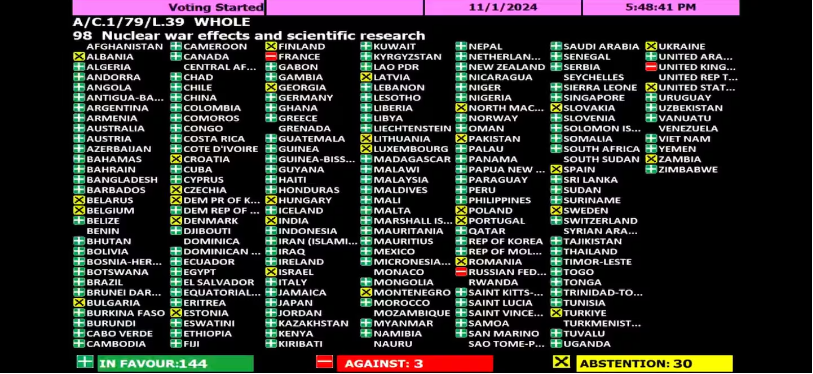UN creates study group on the effects of a nuclear war
The proposal was supported by island nations such as Fiji, Kiribati, Palau, Samoa and Tonga, which are still experiencing the consequences of atomic tests in the region. Russia, France and the United Kingdom voted against. According to experts, a clear picture on the consequences of a nuclear conflict could favour new disarmament agreements.
New York (AsiaNews/Agencies) - The UN General Assembly has passed a resolution to establish a commission of independent experts to assess the consequences of a nuclear war. An issue that is still topical for Pacific Island nations because of nuclear tests carried out in the region up until the 1990s.
The decision, promoted by New Zealand and Ireland and supported by Fiji, Kiribati, Palau, Samoa and Tonga, was approved on 1 November with 144 votes in favour. Among the nuclear weapon countries, Russia, the United Kingdom and France voted against, while the United States, India, Israel, North Korea and Pakistan abstained. China, on the other hand, voted in favour.
The resolution calls for the creation of a 21-member panel of experts who will examine the physical and social effects of a potential nuclear war at the local, regional and global levels, analysing the repercussions on climate, agriculture, public health and socio-economic systems. Although the scientists assume that hundreds of thousands of people would die in the event of a nuclear conflict, they believe that the real impact on humanity is currently uncertain due to research gaps.
The study, to be presented in 2027, will be the first of its kind in over 30 years. In fact, the last UN survey dates back to 1988 and focused only on climate change. At the time, France was the only nation still conducting nuclear tests in the Pacific. It stopped in 1996, detonating 29 devices in French Polynesia in the last eight years alone.
In September, the UN Human Rights Council issued a report on human rights violations resulting from the US nuclear tests in the Marshall Islands, a group of five islands and 29 smaller atolls in the northern Pacific Ocean. The 67 tests conducted between 1946 and 1958 left a heavy legacy: health problems, environmental damage, housing difficulties and violations of indigenous rights. For Hilda Heine, President of the Marshall Islands, the nuclear tests have left ‘deep scars’ among the population. The island nation last month elected to join the UN Human Rights Council next year, and has included climate change and nuclear justice among its priorities.
Nine island nations, along with New Zealand and Australia, had ratified the Rarotonga Treaty in 1986 to ban the use, testing and possession of nuclear weapons in the region. However, today, although the number of nuclear warheads is lower than the peak in 1986, nuclear arsenals are again on the rise. According to the Federation of American Scientists, nine countries - Russia, the United States, France, China, the United Kingdom, Pakistan, India, Israel and North Korea - possessed around 12,121 nuclear warheads at the beginning of 2024. Several scientific academies of the G7 countries also recently issued a joint statement, emphasising that ‘in the context of the current global instability, it is imperative to highlight the known consequences of nuclear war’.
For the Pacific countries, the decision approved by the General Assembly is therefore also an important attempt to raise awareness on nuclear disarmament. Fiji's Permanent Representative to the UN, Filipo Tarakinikini, explained that the world needs to understand the ‘unprecedented devastation’ of nuclear weapons, especially in this day and age, with the passing of the generations that lived through World War II. ‘We must awaken people's awareness of the real horrors of nuclear war,’ he said. The hope is that a clear picture of the effects of nuclear power will increase efforts to implement treaties against nuclear weapons.







.png)










